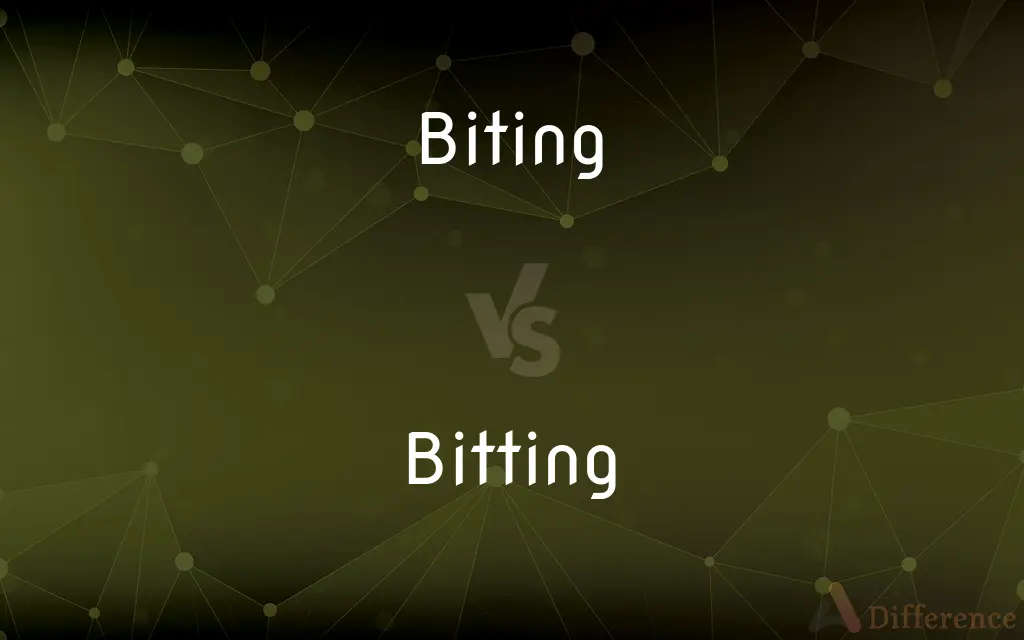Biting vs. Bitting — What's the Difference?
Edited by Tayyaba Rehman — By Fiza Rafique — Updated on March 3, 2024
Biting refers to the act of cutting, seizing, or wounding with the teeth. Bitting is not a commonly recognized English term; likely a typo for "biting" or related to specific contexts like key bitting.

Difference Between Biting and Bitting
Table of Contents
ADVERTISEMENT
Key Differences
Biting is primarily associated with the action where an animal or person uses their teeth to clamp down on something, potentially causing pain or injury. This can be defensive, aggressive, or part of eating. On the other hand, "bitting" is not a standard term in general English vocabulary. It might be a misspelling of "biting" or could refer to specific niche areas, such as the process of shaping the part of a key that engages with the tumblers in a lock.
While biting can be a natural response for animals to threats, a way to explore objects for infants, or an expression of emotion for humans, the term "bitting" might be found in very specialized discussions. For example, in locksmithing or key making, bitting refers to the configuration of the key blade that matches the lock's internal mechanism. On the other hand, ponds are more controlled environments, potentially created for aesthetic or practical purposes, like providing water for irrigation or habitats for fish. Swamps, with their more complex ecosystems, can be crucial for biodiversity, supporting a wide range of flora and fauna adapted to wet conditions.
Biting plays a significant role in various contexts beyond the literal, including metaphorical uses to describe harsh or penetrating effects, such as "biting cold" or "biting sarcasm." In contrast, "bitting" does not have such metaphorical applications and remains a technical term with limited use outside specific professions or activities.
Understanding the context is crucial when encountering the term "bitting." If the discussion involves keys, locks, or mechanisms, "bitting" is likely the correct term. However, in most other contexts, especially those related to the action of using teeth, "biting" is the appropriate word, reflecting its broader application and recognition in the English language.
Comparison Chart
Definition
The act of cutting, seizing, or wounding with teeth.
Likely a misspelling or specific to locksmithing (key bitting).
ADVERTISEMENT
Context
General use, applicable to animals and humans.
Specialized or technical contexts, especially locksmithing.
Usage
Widely recognized and used in various contexts.
Limited, niche areas.
Metaphorical Use
Yes (e.g., "biting wit").
No.
Relevance
Broad, encompassing physical and metaphorical applications.
Narrow, specific to certain professions or hobbies.
Compare with Definitions
Biting
Harsh, penetrating commentary.
The review was noted for its biting criticism.
Bitting
Related to the mechanism that increases a lock's security.
The lock's security depends on its bitting pattern.
Biting
Describes sharp or penetrating sensations.
The biting wind chilled them to the bone.
Bitting
Specific to locksmithing, refers to the configuration of a key.
The locksmith examined the bitting of the key.
Biting
Seizing or cutting with the teeth.
The dog's biting caused a minor injury.
Bitting
The process of cutting a key to match a lock.
Accurate bitting is essential for the key to work.
Biting
A way to show frustration or aggression.
When cornered, the cat started biting.
Bitting
A term used in the study or practice of making locks.
He learned about bitting in his locksmithing course.
Biting
Infants' way of learning about their world.
The baby is biting everything within reach.
Bitting
Used within specific trades or hobbies.
Enthusiasts discuss bitting codes in online forums.
Biting
Biting is a common behavior involving the opening and closing of the jaw. This behavior is found in reptiles, mammals, fish and amphibians.
Common Curiosities
How are biting and bitting different?
Biting is a universal action related to using teeth, with broad applications including metaphorical uses. Bitting is a specialized term with limited application outside locksmithing or related fields.
What does bitting refer to?
Bitting typically refers to the configuration of a key's blade that interacts with a lock's tumblers, mainly used in locksmithing.
What is biting?
Biting is the act of using teeth to cut, seize, or wound, commonly observed in animals and humans.
Can biting be metaphorical?
Yes, biting can describe metaphorical sharpness, such as biting wit or biting criticism, indicating harshness or penetrative quality.
What role does biting play in nature?
In nature, biting is a crucial behavior for survival, used for feeding, defense, and sometimes as part of mating rituals. It's an essential aspect of predation and interaction among species.
Is "bitting" a common English word?
No, "bitting" is not widely used in general English and mainly appears in specific contexts like locksmithing or key-making.
Can animals be involved in bitting?
No, animals are not involved in bitting as it is a technical term related to the configuration of keys and locks, not the action of using teeth.
How does biting affect human behavior?
Biting can be a natural reflex, especially in infants exploring their environment, or a response to stress and anxiety. It might signify aggression or be used metaphorically to describe sharp or incisive actions or speech.
Is bitting important in everyday language?
Bitting is not commonly used in everyday language and is primarily important in specialized fields such as locksmithing, where it pertains to the specifics of key and lock mechanisms.
How can one learn about bitting?
Learning about bitting usually requires studying locksmithing or engaging in hobbies related to lock picking or key collecting, where understanding the mechanics of locks and keys is fundamental.
Share Your Discovery

Previous Comparison
Pillory vs. Stocks
Next Comparison
Longsword vs. GreatswordAuthor Spotlight
Written by
Fiza RafiqueFiza Rafique is a skilled content writer at AskDifference.com, where she meticulously refines and enhances written pieces. Drawing from her vast editorial expertise, Fiza ensures clarity, accuracy, and precision in every article. Passionate about language, she continually seeks to elevate the quality of content for readers worldwide.
Edited by
Tayyaba RehmanTayyaba Rehman is a distinguished writer, currently serving as a primary contributor to askdifference.com. As a researcher in semantics and etymology, Tayyaba's passion for the complexity of languages and their distinctions has found a perfect home on the platform. Tayyaba delves into the intricacies of language, distinguishing between commonly confused words and phrases, thereby providing clarity for readers worldwide.














































